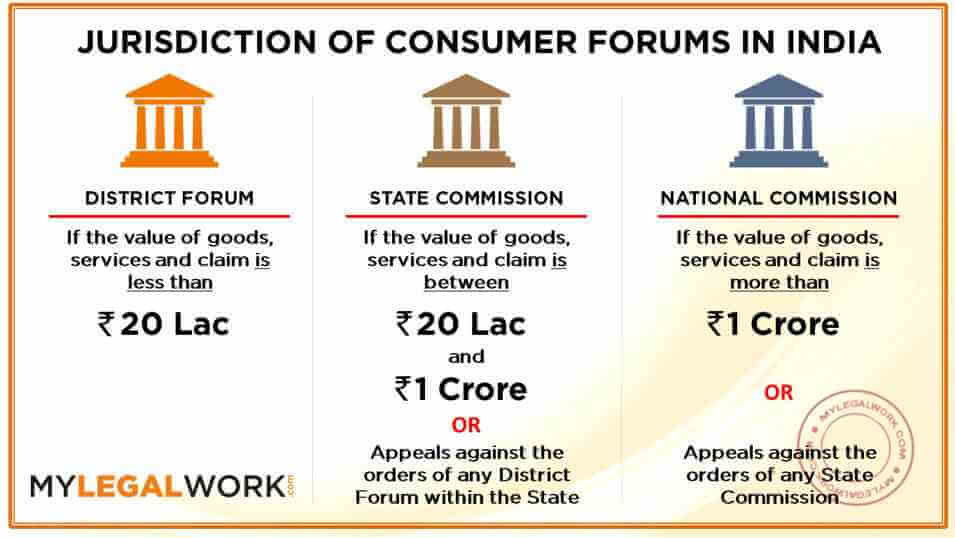
Consumer Disputes Redressal Agencies
INTRODUCTION :
When we approach the market as a shopper, we tend to expect value for cash, Right quality, Right amount, Right costs, data regarding the mode of use, etc. however, there are also instances wherever a shopper is troubled or cheated. an Act to provide for the better protection of the interest of shoppers and for that purpose to form provision for the institution of consumer councils and different authorities for the settlement of consumer disputes and for matters connected thereupon.
AIMS AND OBJECTIVES :
Consumer Protection Act is AN Indian federation law enacted in 1986 to safeguard the interests of customers in India. It makes provision for the institution of consumer councils and alternative authorities for the settlement of consumerdisputes and matters connected thereupon. The growing interdependence of the world economy and international character of the many business practices have contributed to the event of universal stress on consumer rights protection and promotion. Consumers, purchasers, and customer’s world over are demanding value for cash within the variety of quality products and higher services. Trendy technological developments have no doubt made an excellent impact on the standard, handiness, and safety of windfall services. However, the fact of life is that the customers are still victims of illegal and exploitatory practices.
Exploitation of consumers assumes varied forms like adulteration of food, spurious medicine, dubious rent purchase plans, high costs, poor quality, deficient services, deceptive advertisements, unsafe merchandise, black marketing and many more. Additionally, with the revolution in information technology, newer sorts of challenges are thrown on the buyer like cyber crimes, plastic money, etc., that affect the consumer in an even bigger way. “Consumer is sovereign” and “customers the king” are nothing more than myths within the present situation, particularly within the developing societies. However, it’s been realized and rightly so that consumer protection could be a socio-economic program to be pursued by the govt also because the businesses the satisfaction of the customers is within the interest of each. In this context, the govt, however, features a primary responsibility to safeguard the consumers’ interests and rights through applicable policy measures, legal structure, and body framework. The intention and object of the Consumer Protection Act are to provide a speedy remedy and for higher protection of interests of the consumer.
The Consumer Protection Act, 1986, has outlined the term consumer. solely the complainant who falls below the definition of a consumer will be benefited through the Consumer Protection Act. thus the definition of consumer is of abundant importance to determine the relevance of the Act.
METHOD AND METHODOLOGY :
The investigative study attempts to examine the effective presentation of Consumer disputes redressal agencies functioning at the National, State, and District level of India. The objective is to analyze the number of cases filed/disposed of and to compare the performance of efficiency of various consumer dispute Redressal agencies working at national, state, and district levels. The secondary data have been collected from Annual reports, bulletins, and journals published by the voluntary consumer organization in India, e-journals, websites, Articles, and news related to consumer protection.
DETAIL REPORT OF PROJECT :
The Consumer Protection Act, 1986 provides for the institution of the subsequent agencies for the settlement of consumer disputes:
A consumer Disputes Redressal Forum or ‘District Forum’ to be established by the government in every district of the State by notification subject to the provisions that the government may if it deems work, establish more then one District Forum in an exceeding district.
A consumer Disputes Redressal Commission or ‘State Commission’ to be established by the government within the State by notification and a National Consumer Disputes Redressal Commission to be established by the Central Government by notification.
The institution of those forums has provided another remedy to the jurisdiction of the civil courts. District Forum entertains the cases wherever the worth of the claim is up to Rs.5 lakh. State Commission entertains the cases wherever the worth of the claim is up to Rs.20 lakh. State Commission has the facility to settle the appeals created against the order of the District Forums. State Commission may call for the records and pass acceptable orders in any consumer dispute that is unfinished before or has been determined by any District Forum within the State. Being the best consumer Forum, the National Commission could entertain all the matters wherever the worth of claim exceeds Rs.20 lakh. The National Commission additionally has the proceeding and revisional jurisdiction.
Redressal Forums have been established at three different levels:
- District Forum by State Government. At least one in each district or certain cases, one District Forum may cover two or more districts.
- State Commission by State Government.
- National Commission (National Consumer Disputes Redressal Commission ) by Central Government.

District forum
This shall consist of :
- A person who is, or has been, or is qualified to be a District Judge, its President
- Two other members shall be persons of ability, integrity, and standing and have adequate knowledge or experience or have shown capacity in dealing with problems relating to economics, law, commerce, accountancy, industry, public affairs or administration, one of whom shall be a woman.
State commission
It shall consist of:
- A person who is or has been a Judge of a High Court, who shall be its President ;
- Two other members ( as for District Forum).
National Commission
This shall consist of:
- A person who is or has been a Judge of the Supreme Court, who shall be its President. (No appointment under this clause shall be made except after consultation with the Chief Justice of India) .
- Four other members (qualifications: As for District Forum /State Commission ).
Penalties
Where a person against whom a complaint is made or the complainant fails or omits to comply with any order made by the District Forum, the State Commission or the National Commission, as the case may be, such person or complainant shall be punishable with imprisonment for a term which shall not be less than one month but which may extend to three years, or with fine which shall not be less than 2,000 rupees but which may extend to 10,000 rupees or with both. In exceptional circumstances, the penalties may be reduced further.
ANALYSIS OF DATA :
Analysis of Cases filed/disposed at Various Consumer Disputes Redressal Commission as on 28.10.13 The Table A shows the total number of cases filed in the National Consumer Disputes Redressal Commission of India till 28.10.2013 is 83498. The table exhibits that 87% of the cases filed since the inception of NCDRC of India have been disposed of, and only 13% is pending. The commission is trying its best to effectively redress the grievances of the consumers at the national level. Further, the total number of cases filed in the State Consumer Disputes Redressal Commission of India till 28.10.2013 is 616936. 85% of the cases filed since the inception of NCDRC of India have been disposed of, and 15% are pending.
CONCLUSION :
Consumer protection is always a matter of great concern. From the analysis of performance about the disposal rate of cases of various Consumer Disputes Redressal Agencies in India, it is found that the agencies at the district level are on the top followed by national level and state level it is observed that district-level agencies are working efficiently than the national and state-level agencies. There is still a need for agencies functioning at the state and national levels to dispose of the pending cases as early as possible by creating supplementary benches as per the provisions of the Consumer Protection Act, 1986.
SUGGESTION:
Establish relations through Universities, Schools, etc. to highlight the requirement of consumer education in the program of study. Encourage and support universal alertness of the rights of the consumer by cheering consumer education Motivational campaigns for prospective customers both in urban and rural areas should be performed. Arrange seminars and workshops and offer a proposal for the worn argument of the issues and develop suitable corrective action.
ACKNOWLEDGMENT:
My profound gratitude to all the faculty members of the Department, for their timely assistance and encouragement throughout my research work.
I duly acknowledge the encouragement and support from the research scholars in the department, and all my colleagues and friends.
It gives me immense pleasure to take the opportunity to all the people who are directly or indirectly involved in the completion of my project based on Consumer Disputes Redressal Agencies
With deep reverence, I offer my deepest gratitude _____, without whom this project could not have been fulfilled.
Lastly, I thank Almighty, my parents, family members, friends, and teachers for their constant encouragement and support, without which this project would not be possible.
Name of School/College
BIBLIOGRAPHY / REFERENCE :
- www.wikipedia.com
- www.ncdrc.com
- Organization and management studies HSCtextbook
- www.quora.com
In order to download the PDF, You must follow on Youtube. Once done, Click on Submit
Follow On YoutubeSubscribed? Click on Confirm
Download Consumer Disputes Redressal Agencies PDF







